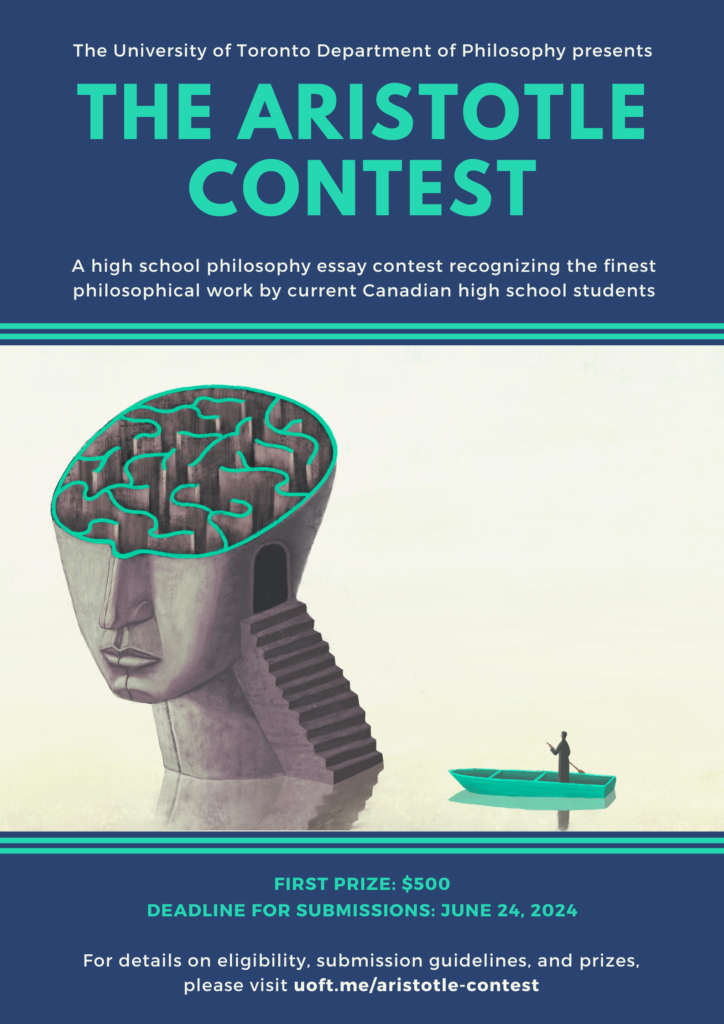
High school students, listen up—the 2024 Aristotle Contest is now open for submissions! Pick one of three essay prompts and showcase your skills of philosophical argumentation and clear writing for one of three cash prizes! The submission deadline has been extended to July 29, 2024.
You can also read an interview with a previous competition winner.
What Is the Aristotle Contest?
In collaboration with the Ontario Philosophy Teachers’ Association, the department administers the annual Aristotle Contest, awarding cash prizes for the finest philosophical work by current Canadian high school students. The contest provides high school students interested in philosophy with an opportunity to have their work evaluated and recognized by the largest post-secondary Department of Philosophy in North America.
- Eligibility
- Instructions
- Assessment
- Submission
- Prizes
- Previous winners
- Frequently asked questions
- Contest sponsors
- Printable poster
Eligibility
Anyone enrolled in a Canadian high school at or below the grade 12 level (or equivalent) may participate in the Aristotle Contest. Home-schooled students working at or below the grade 12 level may also participate.
Submissions in both English and French are welcome.
Instructions
Three questions are posted for this year’s contest; contestants must choose only one. The questions for the 2024 contest were:
- Could an AI ever produce works of art with the kind of aesthetic value that works of art created by humans possess? Defend your answer.
- Some philosophers and scientists believe that humans have free will while others deny it. But why does it matter whether we have free will? Would it be bad if it turned out that we lack it? Why or why not?
- Hundreds of millions of people around the world own pets: dogs, cats, hamsters, horses, birds, snakes, and dozens of other kinds of animals. But none of these creatures can tell us how they feel about this arrangement, and many animal rights advocates have begun arguing that pet ownership is wrong. Is it morally permissible to own pets? Defend your answer.
Contestants will write an essay of no more than 1200 words that develops and defends a position taken in response to the chosen question. Essays must be submitted electronically as a Word document (not PDF) in 12-point font, double-spaced and, if using quotations or ideas from the readings or other sources, with complete referencing. (Note that the word count has been reduced from 1200-1500 to 1200 words; this word count does not include references, if any.) Essays proper should be prepared for blind review, that is, they should not bear the author’s name or any other mark identifying them.
Contestants are not required, encouraged, or expected to do any reading or research beyond reading the chosen question. If contestants choose to use ideas from other sources they will not be penalized for doing so, provided the sources are properly identified. The top ten entries will undergo a plagiarism check.
For a variety of resources on writing in philosophy, visit our Advice on Writing in Philosophy page. For a detailed guide on how to compile, organize, and express your thoughts for the essay in this contest, see the Aristotle Contest Guide to Writing a Philosophy Essay (PDF).
Assessment
Essays will be judged according to several criteria, including the quality, depth, and originality of thought; the organization of ideas; and clarity of expression.
View the Aristotle Contest Evaluation Scheme (PDF).
Author names and school affiliations of contestants are redacted so that they remain anonymous to evaluators. In the first round of evaluation, each paper is marked twice: once by a high school teacher and once by a university-affiliated evaluator (a faculty member in U of T’s Department of Philosophy).
A list of ten finalists is then drawn from papers that were ranked highest by both sets of judges. Evaluators then come to a consensus on the contest winners and recipients of certificates of distinction.
Contest winners will be announced October 2024.
Submission
To be eligible, each submission must be emailed as an attached Word document (not PDF) along with a completed contest form (PDF). You can either fill in the PDF electronically using an online PDF-filling tool like PDFescape (electronic signatures are acceptable), or you can print the form, fill it out on paper, and scan and attach it to your entry. Entries must be emailed; printed entries sent by regular mail will not be accepted. Essays that have been submitted to other venues will also not receive consideration.
Submission emails must be dated Wednesday, July 29, 2024, or earlier. Late entries will not be accepted. All submissions must be emailed as attachments with the subject line “Aristotle Contest entry” to:
Petra Dreiser, Communications Officer, Department of Philosophy
(petra.dreiser@utoronto.ca)
Prizes
First place: $500
Second place: $400
Third place: $300
Up to ten submissions will receive an honourable mention.
Previous winners
Take a look at the winning entries from last year (2023). Prizes were awarded to:
- First Place: Owen Yisu Wang, St. George’s School, Vancouver, BC: The Defense of Art: The Dichotomy of Creator and Creation” (PDF)
- Second Place: Maria Yuanyi Ma, Marianopolis College, Westmount, QC: “Drawing the Line: Reconsidering the Basis for Judging Work by Morally Flawed Artists” (PDF)
- Third Place: Serena Chin, Richmond Secondary School, Richmond, BC: “Finding Certainty in Subjectivity” (PDF)
The following essay received an honourable mention in 2023:
- Helen Li, Lisgar Collegiate Institute, Ottawa, ON: “Fair or Unfair? Cherry Picking Dating Partners by Appearance” (PDF)
In 2022, prizes went to:
- First place: Aarah Shahjahan, Marc Ganeau Collegiate Institute, Toronto, Ontario: “In Times of Crisis: When Safety Precedes Liberty” (PDF)
- Second place: William Wang, University of Toronto Schools, Toronto, Ontario: “The Universal Immorality of Perjury” (PDF)
- Third place: Natalie Oulikhanian, Aloysius Gonzaga Secondary School, Mississauga, Ontario: “Redefining Our Liberties: A Communal Approach to Vaccine Mandates” (PDF)
The following essay received an honourable mention in 2022:
- Max Long, Richmond Secondary School, Richmond, British Columbia: “When It’s OK to Lie: The Case of Ethical Perjury” (PDF)
In 2021, prizes went to:
- First place: Alissa Li, University of Toronto Schools, Toronto, Ontario: “Beyond Borders: A Global Vaccine Solution” (PDF)
- Second place: Maisy Elspeth, Leaside High School, East York, Ontario: “Veganism as Moral Imperative” (PDF)
- Third place: Wilson Li, William Lyon Mackenzie Collegiate Institute, North York, Ontario: “Rationality of an Open Mind” (PDF)
The following essays received honourable mentions in 2021:
- Sarah Youssef, Port Moody Secondary School, Port Moody, British Columbia: “A Case against Cruelty” (PDF)
- Jessica Oh, St. Elizabeth Catholic High School, Thornhill, Ontario: “Money Should Not Factor in Vaccine Distribution” (PDF)
In 2020, prizes went to:
- First place: Darwin Pitts, Lisgar Collegiate Institute, Ottawa, Ontario: “In Defence of Legitimate Democratic Authority” (PDF)
- Second place: Justin Liu, St. George’s School, Vancouver, British Columbia: “A Defense of Privacy in the Digital Age” (PDF)
- Third place: Andrei Li, Monarch Park Collegiate Institute, Toronto, Ontario: “On the ‘Good Life’ and Perpetuation of the ‘Self’” (PDF)
The following three essays received honourable mentions in 2020:
- Ariel Wang, Port Moody Secondary School, Port Moody, British Columbia: “On the Fantasy of a Good Life“ (PDF)
- Ryangwon Kim, Brentwood College School, Mill Bay, British Columbia: “A Case against Anarchy” (PDF)
- Zeeniya Waseem, Turner Fenton Secondary School, Brampton, Ontario: “Inner Contentment and Fulfillment within a Good Life” (PDF)
In 2019, prizes were awarded to:
- First place: Elizabeth Zhu, University of Toronto Schools, Toronto, Ontario: “Reality Is a Shared Hallucination” (PDF)
- Second place: Ayush Ranjan, The Woodlands School, Mississauga, Ontario: “On the Subjectivity of Reality and the Benefits of a Simulated World” (PDF)
- Third place: Ritvik Singh, Academy for Gifted Children–P.A.C.E., Richmond Hill, Ontario: “A Treatise on Creative Artificial Intelligence” (PDF)
The following three essays from 2019 received honourable mentions:
- Sameer Bapat, A. Y. Jackson Secondary School, North York, Ontario: “The Creative Capacity of Artificially Intelligent Machines” (PDF)
- Kacper Mykietyn, St. Martin Secondary School, Mississauga, Ontario: “Distribution of Genetic Resources and Its Consequences” (PDF)
- Keyer Thyme, Marc Garneau Collegiate Institute, North York, Ontario: “In Defence of the Simulation” (PDF)
Read more about the successful 2019 contestants.
In 2018, prizes were awarded to:
- First place: Eric Fishback, Guelph Collegiate Vocational Institute, Guelph, Ontario: “The Universal Objective Truths of Aesthetics” (PDF)
- Second place: Abdullah Farooq, Streetsville Secondary School, Mississauga, Ontario: “An Essay on the Importance of Cognition in Aesthetic Judgements” (PDF)
- Third place: Donald Lv, Albert Campbell Collegiate Institute, Scarborough, Ontario: “Should AI Be Granted Rights” (PDF)
The following four essays from 2018 received honourable mentions:
- Emily Tu, Lawrence Park Collegiate Institute, Toronto, Ontario: “Inimitable Human Intelligence and the Truth on Morality” (PDF)
- Woojin Lim, Fraser Heights Secondary School, Surrey, British Columbia: “The Future of Smart Machines: Intelligence, Morality, and Rights” (PDF)
- Adam Aziz, The Academy for Gifted Children P.A.C.E., Richmond Hill, Ontario: “Artificial Intelligence vs. Human Intelligence” (PDF)
- Samuel Chan, Albert Campbell Collegiate Institute, Scarborough, Ontario: “The Humanity in Machines” (PDF)
Frequently asked questions
How much of my essay can include quotes from other sources?
Any quotations will be considered part of the word count. You may use as many quotations as you wish, keeping in mind that the more you use, the less space you will have for developing your own thoughts. Quotations must, of course, be properly referenced.
If my essay is slightly over the 1200 word count limit, will it still be accepted?
No, any paper over the 1200 word count limit will not be accepted. In order to be fair and avoid questions regarding leeway, this rule will be strictly followed.
May I submit my essay physically, by regular mail or in-person at the department?
No. Only electronic submissions will be accepted.
Is CEGEP equivalent to high school grade 12?
For this contest, the first year of CEGEP is equivalent to high school grade 12. Anyone enrolled in the second year of CEGEP is not eligible to participate.
I home-school my child, but the contest form seems designed for teachers. Is there another form that I should use?
No need to use another form. Use the contest form (PDF) and in place of the school address and phone number, put your home address and phone number.
Contest sponsors
- The Department of Philosophy at the University of Toronto, St. George campus
- Ontario Philosophy Teachers’ Association
Printable poster
View, share, download, and print the contest poster.

